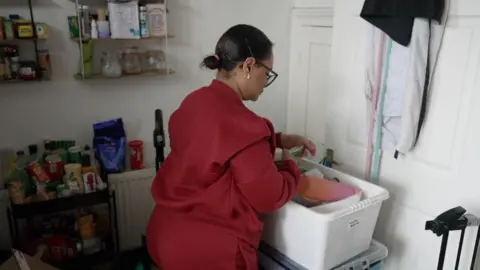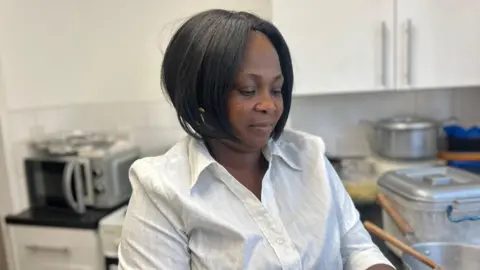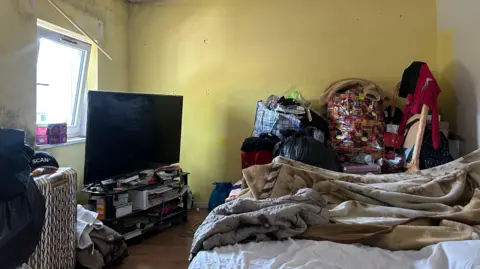Work & Money Correspondent, BBC London
 BBC
BBC“I spent all of half-term looking for somewhere to live,” says mother-of-three Shanice Aird.
The 29-year-old from west London rejected her council’s most recent temporary accommodation offer “an hour away” from her children’s school.
The Shared Health Foundation is urging the government to put in measures to stop children in temporary accommodation going “missing” from schools and GPs after widespread displacement of families across the country.
The charity’s new report calls for a notification system so that all authorities are aware when a child moves into temporary accommodation.
The government says it is investing £1bn in homelessness services this year to help families trapped in temporary accommodation.
‘My family will soon be homeless’
Ms Aird was living in a secure tenancy flat in Ealing with her three children, aged three, five and seven, but was moved to temporary accommodation in Hounslow in 2021 after witnessing a stabbing.
She is now being evicted from the two-bedroom property by the landlord, but says Ealing Council has only offered her unsuitable alternative accommodation, including one flat an hour away from her children’s school.
Ms Aird says she will soon be homeless and will have to “sofa surf with friends” after the council discharged her from their housing duty.
“We haven’t been able to do anything this half-term because I’m constantly on the phone to councils, emailing, trying to get as much help as I can,” she says.
She admits her children’s attendance at school is “awful” as they do not have a permanent home.
“It’s really horrible because as a mum you want to try and provide as much safety and happiness as you can.”

Ms Aird says she needs to be close to family and friends to help with her mental health.
“I have bipolar type 2 and tend to go into depressive episodes, if it’s a really bad episode it leads to me not being aware of what I’m doing,” she says.
“I’m happy to move to another borough, as long as I’ve got some kind of family support network.”
Ealing Council said Ms Aird was recently made offers of “suitable properties both in and out of the borough within easy reach of her support networks”, which she refused.
“Because of her refusal of these property offers, the council have discharged her main housing duty, and we have made a referral to children services at Hounslow Council who may be able to support her under the Children’s Act,” it added.
‘Normal childhood’
More than 164,000 homeless children are currently living in temporary accommodation across England, the highest number on record, figures show.
Analysis of government data by homeless charity Shelter suggests there are almost 94,000 children in London living in temporary accommodation.
As a result, families are being displaced with some Londoners being moved miles away due to a lack of permanent affordable housing in the capital, according to Alicia Walker, Shelter’s assistant director for activism and advocacy.
“We’re sending children and families from London to Manchester, but Manchester has the very same problem, then the children and families in Manchester might be moved to Durham…it means we’ve got a country of displaced people,” she says.
Dr Laura Neilson, founder of the Shared Health Foundation which co-chairs the All-Party Parliamentary Group on temporary accommodation, says they want to see children “still have access to education and healthcare” so they “get to live a much more normal childhood than these children are experiencing”.
“We are asking the government to be more curious about how many children are missing from education because of temporary accommodation,” she adds.

Felicity Afriyie has lived in temporary accommodation for 21 years with her three children aged 16, 19, and 20.
In that time they have lived in more than 10 houses.
Currently, they are living in a one-bedroom hostel in Lambeth, south London.
In previous temporary accommodation, she says her children’s journeys to school took two hours.
The 53-year-old says it took so long to do the school run she “spent the whole day” waiting for her children to finish school.
“Sometimes you see schoolchildren on the bus sleeping because they come from very far,” she says.
‘It’s not a level playing field’
Her daughter Grace, 20, says: “One of our school journeys was two hours.
“Doing that distance to school every day was awful. It’s had a massive impact on our education.
“You can’t expect a 16 year old… that’s moved houses more times than they can count to sit a set of exams that will change their life and expect them to perform as well as their more stable affluent counterparts.
“It’s not fair and it’s not a level playing field.”
Grace says she has dropped out of university due to the stress of temporary accommodation.
“Some of us are actually trying to get out of the system,” she says.
“We’ve grown up like this and we don’t want the generation after us to be in the same position. We’re never going to get out of the system when it’s stacked against us.”
Lambeth Council says it had made a direct offer of suitable permanent accommodation to Ms Afriyie but she turned it down and requested a review. The review found that the permanent property proposed was suitable.

Local authorities have a legal duty to provide temporary accommodation to anyone who qualifies as homeless.
Adam Hug, housing spokesperson for the Local Government Association, is calling on the government to urgently increase the temporary accommodation subsidy in the upcoming Spending Review.
“Frozen temporary accommodation subsidy rates have left councils to pick up more than £700m in temporary accommodation costs that they are unable to claim back from government.”
The government says the forthcoming Children’s Wellbeing and Schools Bill aims to introduce better protections for all children and better join-up between children’s social care, schools and other local services.
Through the children not in school registers, there will be a single unique identifier for every child and a requirement for every council to have multi-agency child protection team.
“Protecting vulnerable children falling through the cracks are at the heart of the forthcoming Children’s Wellbeing and Schools Bill, which represents the single biggest piece of child protection legislation in a generation,” a government spokesperson said.
“We are also investing £1bn in homelessness services this year to help families trapped in temporary accommodation, driving up housing standards and delivering on our commitment to build more social and affordable homes.”

